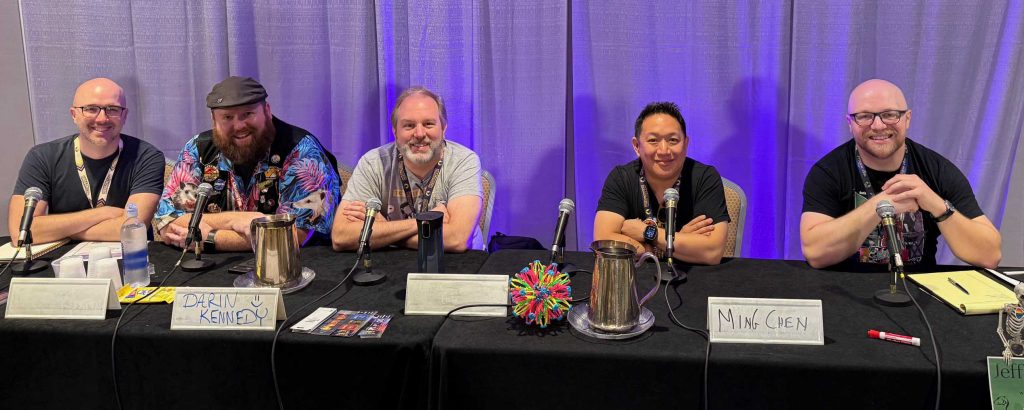
To be a good guest, treat the host like a human being with whom you are having a conversation. On Sunday at 1PM, the Digital Media Track hosted “Be A Podcast Guest Pro: How to Get Booked (and Invited Back!)” at the Hilton Galleria 6. Moderator Clint Hall, a science fiction and fantasy author, led the panel featuring author-podcaster Bob McGough, contemporary fantasy author Darin Kennedy, podcaster and studio owner Ming Chen, and author Jeffrey Nix. Together, they offered candid, practical advice for writers, film makers, musicians, and other creatives looking to expand their reach through podcast appearances.
Hall started the panel by pointing out that a common misconception is that success means landing a spot on the biggest podcasts. McGough suggested that smaller, niche shows are often the best place to begin. “You probably won’t be great at first,” he admitted. “Until you get your sea legs under you, don’t start with your dream podcast.”
Kennedy emphasized choosing shows that reach the people you want to connect with. “Where are your people?” he asked, adding that podcasts are eager for good guests who help promote episodes after airing. Nix agreed, noting that his early podcast appearances grew from friendships within communities. When he got started as a writer, he did not have a website, social media, or much to talk about. Instead, he started off as a guest on martial arts podcasts because he had a background in it and had competed.
Hall reminded attendees that every appearance, regardless of size, creates content that you can promote. “In psychology, that’s referred to as social proof,” Nix said. McGough mentioned that he keeps a Spotify playlist of all the podcasts he’s been a guest on, so his fans may go listen to them later.
Once creators have identified a podcast they want to be a guest on, Hall asked the panelists how to get booked. Chien encouraged reaching out directly via email or direct message with clear reasons for wanting to appear plus links to past appearances, if available. Hall agreed, pointing out that newer podcasts are always looking for guests. Nix suggested finding out what the podcast host is hoping to achieve with the show. Listen to episodes to learn about it, then try to help them as part of your guest appearance.
Hall turned the discussion to how to be a great guest once creators are booked on a podcast. Kennedy recommended clarifying topics with the host in advance, while Nix suggested collecting interesting questions to offer the host to help them out. McGough reminded the audience to verify the technical details for the show. Learn the host’s time zone and show up early.
During recording, the best guests are conversational. “Think of it as a chat that just happens to be recorded,” Chen said. If you feel nervous or uncomfortable, McGough advised practicing responses in front of a mirror to prepare.
An audience member asked what podcast hosts can do to make the experience better for guests. The panelists suggested providing clear technical guidelines, sending questions in advance, if appropriate, and letting guests hear the episode before publishing in case they would like something edited out. Chen also suggested asking guests if there is anything they do not want to talk about on the show.
For anyone nervous about their first appearance, Nix recommended training tools like Toastmasters to build comfort and confidence. Chen noted that while a podcasts may have a huge audience, during recording it’s just the host and the guest, which helps put people at ease. He also pointed out how hosts can help, perhaps getting the guest talking some before starting to record.
McGough, a self-professed introvert, summed it up best: “Podcasting is me turned up to eleven.”
